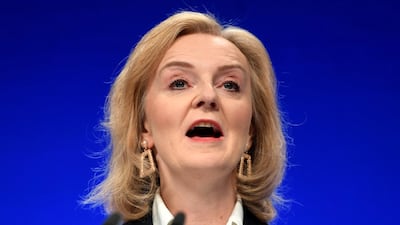A US trade deal is not the “be-all-and-end-all” for the UK, as there are other countries lining up to reach agreements, Foreign Secretary Liz Truss has said.
She highlighted the Pacific trade bloc, Israel, India – where she will take her next official visit – and the Gulf states as possible candidates for trade deals.
Joe Biden’s election as US president has pushed back the prospect of a transatlantic trade deal, and Ms Truss said she would not guarantee there would be one by the end of the decade.
“I don’t agree with you that that’s the be-all-and-end-all of trade,” she said at a Conservative Party conference fringe event in northern English city Manchester.
“My message to the Americans is, ‘We’re ready when you are ready,’ but there’s a whole world out there. There are lots of fast-growing parts of the world who want to do business with Britain and there’s a full pipeline of trade deals we are negotiating.”
Ms Truss, who was international trade secretary until September’s Cabinet reshuffle, said there was a foreign policy need for the UK, US and allies to trade with developing countries to prevent them being drawn into the orbit of “authoritarian regimes”.
China has used its Belt and Road Initiative to forge economic links with countries throughout the developing world, financing infrastructure projects to help boost its influence.
Ms Truss told the Telegraph’s Chopper’s Politics podcast event: “What I think is really important, this goes to broader foreign policy, is that we, the Americans, the Australians – our friends and allies – are reaching out to developing countries to trade with them.
“Because if we are not reaching out to them, who is? Well, the answer is it’s authoritarian regimes who don’t have their best interests at heart, who don’t believe in freedom and democracy like we do.”
She said China had to “play by the rules” on the international stage.
“My view is the way we challenge authoritarian regimes across the world is we do it through strength.
“This is why infrastructure agreements with developing countries are so important, so they are not drawn into the orbit of authoritarian regimes.
“It’s why trade agreements are so important, because we want our trade to be with like-minded partners.
“Of course, we have to trade with China, it’s an important trading partner, but it has to be reliable trade and there can’t be intellectual property violation; there can’t be forced technology transfer.”
She said she wanted to build a “network of liberty” made up of like-minded countries.
“We must win this battle for economic influence – and this starts with forging closer ties with our friends and allies,” she said.
The UK is in talks with Japan about better military access and operational support, Ms Truss told members.
She said the UK wants “closer security ties” with allies such as India.
In her main conference speech, Ms Truss suggested wealthy and eco-friendly countries were less likely to harbour terrorists.
“The freer a country is, the wealthier it is, the more secure it is, the greener it is,” she said.
“It is less likely to harbour terrorists and radical fundamentalists, it is less likely to have huge migration outflows, and less likely to go to war.”
Ms Truss said freedom is the best way to influence the world before claiming more needs to be done domestically.
She said: “Freedom starts at home, and we need to win the fight for freedom here in Britain.
“That means as Conservatives we will stand up for free speech, we will stand up for a free press, and we will give everyone across the Britain the opportunity to succeed – regardless of background.
“We reject the zero-sum game of identity politics, we reject the illiberalism of cancel culture, and we reject the soft bigotry of low expectations that holds so many people back.”


